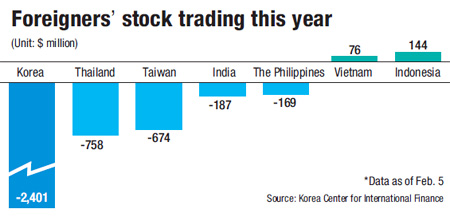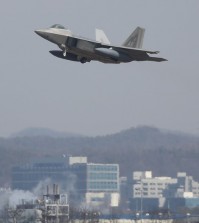- California Assembly OKs highest minimum wage in nation
- S. Korea unveils first graphic cigarette warnings
- US joins with South Korea, Japan in bid to deter North Korea
- LPGA golfer Chun In-gee finally back in action
- S. Korea won’t be top seed in final World Cup qualification round
- US men’s soccer misses 2nd straight Olympics
- US back on track in qualifying with 4-0 win over Guatemala
- High-intensity workout injuries spawn cottage industry
- CDC expands range of Zika mosquitoes into parts of Northeast
- Who knew? ‘The Walking Dead’ is helping families connect
Korea still seen as emerging market
By Kim Rahn
Is Korea an advanced economy or an emerging one?
Most economic data suggests it is the former, given that the nation has a huge current account surplus, sound fiscal health and a large volume of stock trading. However, whenever global financial turmoil hits emerging markets, Korea is sent reeling as if it belongs in the latter category.
While many emerging markets, such as Argentina, recently suffered from volatility caused by the U.S. government’s tapering of its stimulus programs, Korea was no exception. Concerns remain that if the U.S. begins raising interest rates, the blow to emerging markets including Korea could be grave and become like the 1997 Asian financial crisis.
Since the beginning of this year through Feb. 5, foreign investors sold Korean stocks worth 2.5 trillion won ($2.4 billion) on the KOSPI, about 73 percent of 3.4 trillion won, the total amount of their net-buying in 2013.
The amount of capital outflow is larger than that of other emerging countries which are said to have weaker economic fundamentals than Korea. During the same period, foreigners sold stock worth $187 million in India and $758 million in Thailand, while buying stock worth $144 million in Indonesia.
It seems that Korea is somewhere in between the developed and emerging markets: its fundamentals are better than those of many emerging countries, but not enough to stand shoulder to shoulder with advanced nations.
Song Min-kyu, director for the capital markets division at the Korea Institute of Finance, said, “Global investors recognize Korea as the top of the emerging market category.”
The technical cause of the selling is that Korea is categorized as an emerging country in financial indices that global funds refer to, such as the Morgan Stanley Capital International Index (MSCI).
Under the categorization, if global funds increase or reduce investment in emerging nations, it automatically means capital inflow into or outflow from Korea.
Samsung Securities investment strategy center leader Oh Hyun-seok said those index operators say Korea’s financial market is not yet mature enough to get out of the emerging market category.
“Inclusion in the MSCI’s developed market list may not be enough for Korea to be fully recognized as a developed country. If the image investors have of Korea remains as an emerging economy, Korea will face the same fate as other emerging nations whenever global financial shocks occur,” he said.
Oh said that Korea may be an advanced country in terms of the volume of its economy. “But the volume is not the only criterion: China’s economy is the world’s second-largest but that country is still said to be an emerging one.”
“Besides the size of the economy, overall improvement is required in such factors as how mature the financial market is; whether regulations are at the level of advanced nations; whether global companies are operating actively in the market; and whether the Korean won is recognized as a global currency,” he said.
Oh said the huge outflow of foreign capital from Korea this year was partly due to Korea’s emerging market status, but also partly due to Korean companies’ worse-than-expected performance. “Many Korean companies rely on China, while China’s economy is unlikely to grow fast due to social reform drives. So foreigners are reducing investment in Korea in their portfolio.”
Song pointed out that Korea’s financial market needs to be more globalized, while it is now domestic-focused, with mostly domestic companies being listed without major global companies.
“Korea’s strong fundamentals are well recognized. But its financial market lags behind the fundamentals,” Song said.
Nomura economist Kwon Young-sun said another reason for Korea’s emerging market status is that the Korean won is not a reserve currency.
“Korean government does not want the won as a reserve currency because it means 100-percent capital liberalization and therefore could potentially impede Korean exporters’ price competitiveness,” he said.
“Even if Korea wants to have its own reserve currency, global financial markets would not give much credibility to the won as a reserve currency due to geographical risks on the Korean Peninsula.”

















